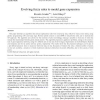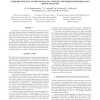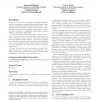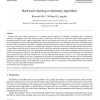602 search results - page 111 / 121 » Unsupervised Problem Decomposition Using Genetic Programming |
125
click to vote
BIOSYSTEMS
2007
15 years 2 months ago
2007
This paper develops an algorithm that extracts explanatory rules from microarray data, which we treat as time series, using genetic programming (GP) and fuzzy logic. Reverse polis...
122
click to vote
WIAMIS
2009
IEEE
15 years 8 months ago
2009
IEEE
In this paper, two approaches to utilizing contextual information in semantic image analysis are presented and comparatively evaluated. Both approaches make use of spatial context...
GECCO
2007
Springer
15 years 8 months ago
2007
Springer
Crossover in Genetic Programming is mostly a destructive operator, generally producing children worse than the parents and occasionally producing those who are better. A recently ...
141
click to vote
Publication
In this paper we address the problem of defining a measure of diversity for a population of individuals whose genome can be subjected to major reorganizations during the evolution...
123
click to vote
AI
2006
Springer
15 years 2 months ago
2006
Springer
Starting from some simple observations on a popular selection method in Evolutionary Algorithms (EAs)--tournament selection--we highlight a previously-unknown source of inefficien...




